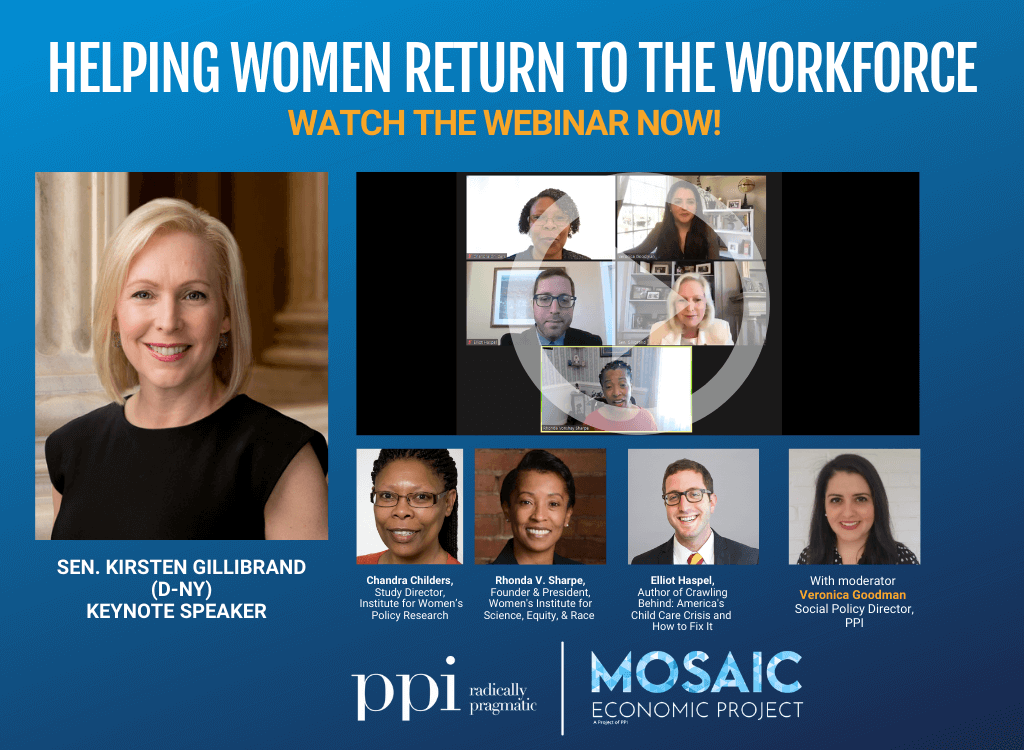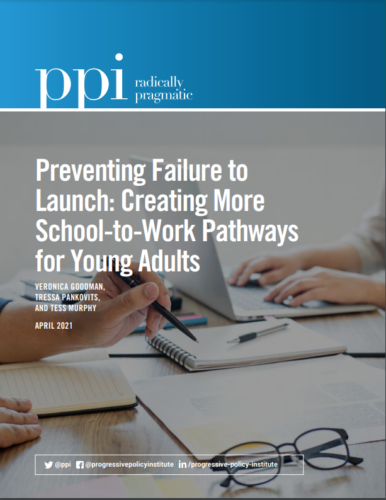Save the Date!
On Tuesday, April 27, the Progressive Policy Institute will host two events with Members of Congress and diverse panels of experts on supporting women in the workforce and creating more opportunities for students and young workers.
In the morning, Sen. Kirsten Gillibrand (D-NY) and Rep. Terri Sewell (AL-07) will keynote an event focused on policies that help women return to the workforce as we emerge from the COVID-19 pandemic.
Later that day, Rep. Chris Pappas (NH-01) will keynote an event with PPI’s Reinventing America’s Schools Project on creating more school-to-work pathways for our students and young adults. Recently, PPI’s Veronica Goodman, Tressa Pankovits, and Tess Murphy published a report titled Preventing Failure to Launch: Creating More School-to-Work Pathways for Young Adults, which focused on four key themes across school-to-work models, including the importance of work-based learning that connects students to employers, re-designing curriculums to emphasize soft skills and social capital, increasing supportive or wraparound services to help students get across the finish line, and helping high-school students earn credits toward postsecondary education.
Information and registration links for both events are below:
Helping Women Return to the Workforce with Sen. Kirsten Gillibrand and Rep. Terri Sewell
On Tuesday, April 27th, PPI is hosting a webinar with special guests Senator Kirsten Gillibrand and Representative Terri Sewell on policies to help the women return to the workforce following the devastating effect of the pandemic on women’s labor force participation. Our panel includes policy experts on labor, child care, and gender and racial equity.
Date/Time:
April 27, 2021 at 10:30AM ET
Keynote Speakers:
Senator Kirsten Gillibrand (D-NY)
Rep. Terri Sewell (AL-07)
Panel:
Veronica Goodman, Director of Social Policy at PPI
Chandra Childers, Study Director at the Institute for Women’s Policy Research
Elliot Haspel, Author of Crawling Behind: America’s Childcare Crisis and How to Fix It
Rhonda V. Sharpe, founder & president, Women’s Institute for Science, Equity, and Race
Kate Bahn, Director of Labor Market Policy at the Washington Center for Equitable Growth
Register here.
Preventing Failure to Launch: Creating More School-to-Work Pathways with Rep. Chris Pappas
On Tuesday, April 27th, PPI’s Reinventing America’s Schools project is hosting a webinar with special guest Rep. Chris Pappas on creating more school-to-work pathways for our students and young adults.
Date/Time:
April 27, 2021 at 1:00PM ET
Keynote Speakers:
Rep. Chris Pappas (D-NH)
Jennifer Kemp, Director of Youth Services, U.S. Department of Labor; Office of Workforce Investment
Panel:
Veronica Goodman, Director of Social Policy at PPI
Tressa Pankovits, Associate Director of PPI’s Reinventing America’s Schools project
Jeanne Russell, Executive Director of the Centers for Applied Science and Technology
Cate Swinburn, President of YouthForce NOLA
Ryan Craig, Managing Director of Achieve Partners
Register here.
Media interested in attending the events can RSVP through Aaron White, PPI’s Director of Communications: awhite@ppionline.org
###






